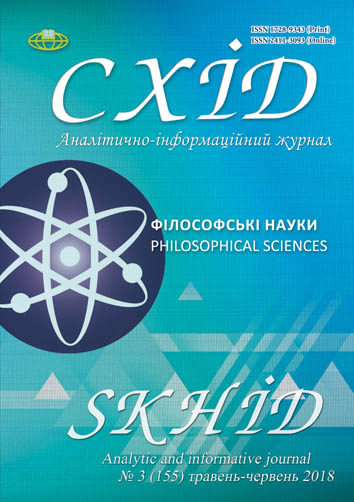The substantial transformation of the concept "existential" in modern philosophical journalism
DOI:
https://doi.org/10.21847/1728-9343.2018.3(155).139673Keywords:
existentialism, existential, social philosophy, personalismAbstract
The article is devoted to the analysis of substantial transformations of existential concept which has arisen within an existentially phenomenology of ontology to M. Heidegger. The relevance of a problem is that in modern philosophical journalism the corresponding concept is used absolutely in other sense. It has basic excellent from the Heidegger's semantic loading. Existence of two parallel philosophical discourses, one of which is placed emphasis on textual criticism, another - on those new horizons which is opened before thinkers owing to variations on exsistentials is stated. It is specified that after K. Jaspers's criticism, M. Heidegger has stopped trying a strict definition of exsistentials and their classifications which would turn them into categories. It is proved that only on condition of an exit out the personalism limits the concept "exsistentials" begins to work in a new, social and philosophical contextDownloads
References
Abdullin, A.R. 2000. Philosophical hermeneutics: initial principles and ontological grounds. Edition of the Bashkir University.Ufa. Available at: http://www.bim-bad.ru/docs/abdullin_hermeneutics.pdf
Borisov, E. 1997. Adialogue like a destiny. An event with Another in existential analytics of M. Heidegger. Istoriya filosofii, №1: 81-98. Available at: https://iphras.ru/uplfile/root/biblio/hp/hp1/7.pdf
Brosova, N.Z. 2006. «Foresttracks» of existence. Martin Heidegger’s phenomenology of history. Voprosy filosofii, № 11: 155-163. Available at: https://refdb.ru/look/3863073.html
Haharin, A.S. 2002 Existentsials of human life in Martin Heidegger’s philosophy. In book: Problems of anthropology and an antropoditsea in philosophy. Main edition R.A. Burkhanov. Yekaterinburg. Urals publishing house, Part 2. Сhapter 3.
Haydenko, P.P. 1970. Ekzistentsial. Philosophical encyclopedia. Soviet encyclopedia,Moscow, 1960-1970. Vol. 5: 538.
Horbenko, K.P. 2016. The concept existential in history-philosophy and social-philosophy discourses. Gileya: academic herald. Issue 115(12): 110-113.
Horbenko, K.P. 2015. Social existentials of East-Ukranian society. Skhid. 2(134): 137-140. DOI: 10.21847/1728-9343.2015.2(134).40313.
Dodonov, R.O. 2000. Metodological characteristic study of mental phenomenon. Social technology. Issue 4: 34-46.
Koloyartsev, V.A. 2004. The concept of being self at M. Heidegger and P. Rikera. Multyversum. Filosofskyy almanakh. Tsentr dukhovnoyi kultury, Kyiv, № 39. Available at: http://www.filosof. com.ua/Jornel/M_39/Kolojar_l.htm
Kopylova, S.V. 2007. Semantic existential of human being: approach in explanation. Culturological herald: Scientific-theoretical almanac: Nizhnyo ї Naddnipryanschini. Zaporizhya: Prosvita, 2007: 163-167.
Molchanov, V.I. 1998. Time and consciousness. The criticism of phenomenological philosophy. Vysshaya shkola.Moscow, 144 р. Available at: http://www.ruthenia.ru/logos/personalia/molchanov/zb.htm
Omarbekova, S.V. 2012. Love is as existential of human being.Nizhnevartovsk. 130 p. (rus).
Razinov, Yu. A. 1999. The concept of category and existential of M. Heidegger’s philosophy. Bulletin of Samara State University. № 1 (11): 57-67.
Sartre, Jean-Paul. 2000. Life and anything: Experience of phenomenological ontology [Translat.]. Respubica,Moscow, 639 p.
Heidegger, M. 1997. Entitative and time [Translat.]. Ad marginem, Moscow, 452 p.
Sharovskaya, A.V. 2009. Social problems in existential philosophy [Translat.]. The transactions PGPY named by V.G. Belinskiy. № 11 (15): 17-18.
Eco, Humberto. 2006. The missing structure. Introduction into a semiology [Translat.] 544 p.
Yarchenko, D.R. 2014. Death is as purpose – /existentsial death. Humanitarian scientific investigation 2014. № 7. Available at: http://human.snauka.ru/2014/07/7011
/ экзистенциал. Гуманитарные научные исследования. 2014. № 7. http://human.snauka.ru/2014/07/7011
Downloads
Published
How to Cite
Issue
Section
License
Copyright (c) 2018 Kateryna Gorbenko

This work is licensed under a Creative Commons Attribution-NonCommercial-NoDerivatives 4.0 International License.
1. Authors bear responsibility for the accuracy of facts, quotations, numbers and names used.
2. Manuscripts are not sent back.
3. The publisher does not always agree with the authors' opinion.
4. The authors reserve the right to authorship of the work and pass the first publication right of this work to the journal under the terms of a Creative Commons Attribution-NonCommercial-NoDerivatives 4.0 International License. This license allows others to distribute (copy) the published work for non-commercial purposes, provided there is mandatory attribution to its authors and a link to the first publication in our journal.
5. The authors have the right to conclude separate supplement agreements that relate to non-exclusive work distribution in the form in which it has been published by the journal (for example, to upload the work to the online storage of the journal or publish it as part of a monograph), provided that the reference to the first publication of the work in this journal is included.

